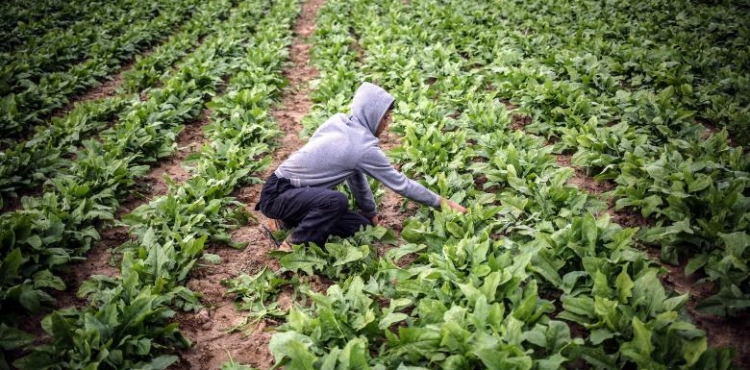Thirty farmer Abdullah Al-Najjar from the Gaza Strip was forced to sell his harvest of guava fruit this year at a price that is 70 percent lower than its original price due to the negative repercussions of the new Corona virus disease (Covid-19) ).
Al-Najjar says that the guava season is limited to between one and a half and two months only, and if he does not pick it and sell it quickly, it will spoil his losses.
He adds that he preferred to sell his harvest for this year at a lower price, hoping that he would be able to collect the "operating expenses that he spent while caring for the guava fruits that he planted on an area of ​​ten dunams."
The carpenter used to sell one kilogram of guava for between 4 and 6 shekels, while he was forced to sell 10 kilograms at the present time for only 16 shekels, due to the weak purchasing power in the local markets.
Farmers in the Gaza Strip complain that they lost their harvest due to the deteriorating economic conditions resulting from the preventive measures to prevent the spread of Corona.
More than 35 thousand farmers and workers work in the agricultural sector in the Gaza Strip, and agriculture is one of the pillars of food security in the sector, while statistics of the Ministry of Agriculture in Gaza estimate losses of the agricultural sector since the outbreak of the Corona crisis by more than two million dollars, while it is feared that the crisis will increase the volume of losses. If it continues.
The Hamas government in Gaza announced the discovery of the first local cases of the disease on the 24th of last August.
After that, a series of strict measures and restrictions were imposed to prevent the spread of the disease among the population, including announcing the complete closure of all governmental and educational institutions and preventing public gatherings and movement between governorates.
However, after several weeks, the government relaxed its precautionary and preventive measures, but it was not enough for farmers to save their harvest of vegetables and fruits, a number of farmers told Xinhua.
The situation is not much different for the farmer Raed Abu Asad, a resident of the city of Deir al-Balah in the middle of the Strip, who complains about the heavy loss he incurred after planting tomatoes, which he was forced to sell at a price 80 percent lower than their original price.
Abu Asad attributed the reason to the closure, which prevented them from exporting vegetables, such as tomatoes, cucumbers, eggplant, and many other vegetables, to abroad through the Kerem Shalom crossing, which is controlled by Israel.
Abu Asad says, "Due to the high costs of growing tomatoes, only about 15 percent of farmers prefer to grow them and market them abroad."
He adds, "The matter is different this year, as most farmers preferred to grow tomatoes to gain more money, but due to the Corona crisis, everyone suffered losses."
He points out that due to the suspension of exports, the supply in the local markets has become large and the demand is less, due to the lack of liquidity and money among citizens, which has caused the weak purchasing power.
Farmers criticize the performance of the ministries of agriculture and economy towards farmers, and their control over prices without providing any of the basic services that prevent them from incurring large financial losses.
For her part, Noha Al-Sharif, media coordinator for Agricultural Relief, affirmed that "the Corona crisis has caused great losses to farmers due to the suspension of exporting fruits and vegetables abroad," noting that they need assistance in marketing their goods locally.
Al-Sharif told Xinhua that relief works to buy tons of vegetables and some fruits from merchants and give them to poor families, in an attempt to reduce farmers´ losses.
"It is important for everyone to unite in facing this acute and unexpected crisis, by holding periodic meetings between farmers and the relevant ministries, in addition to the institutions concerned with the agricultural sector," she added.
The Corona crisis, in addition to the repercussions of the Israeli blockade imposed 13 years ago, doubled the deterioration of the economic and living conditions in Gaza, according to data from the Palestinian Central Bureau of Statistics, which showed that the unemployment rate in the Strip has reached about 56 percent.
Also, about 83 percent of the population of the Gaza Strip live below the poverty line, while the average daily income per person is two dollars, according to the People´s Committee to Face the Siege on Gaza, which is the worst in the world.












